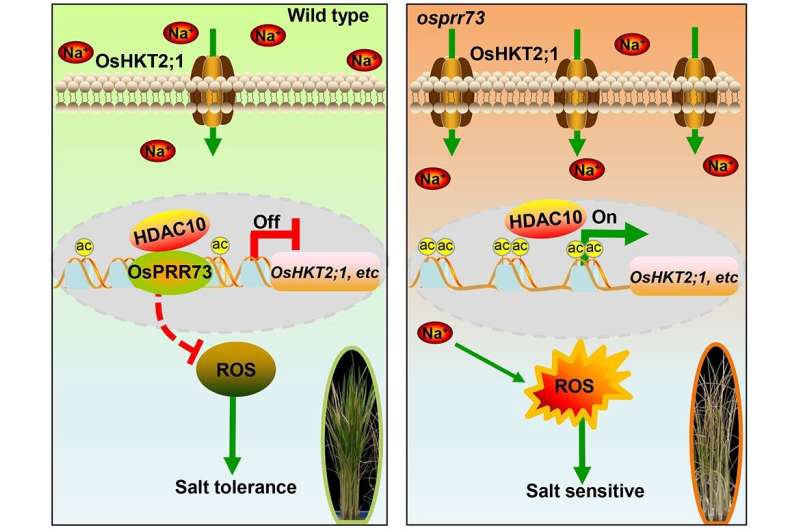Researchers establish molecular link between rice clock components and salt tolerance

Excess sodium ion (Na+), the most widespread soluble cation in salinized soil, can damage plants by the sequential osmotic stress and oxidative stress, especially for glycophyte crops including rice.
The circadian clock, the endogenous time-keeping system in higher plants, has been demonstrated to function as an important integrator of multiple abiotic stresses signals, including salt stress in Arabidopsis. Nevertheless, whether rice core clock components participate in salt tolerance and the underlying mechanisms remain largely unclear.
In a new study published in The EMBO Journal on December 21, a research group led by Prof. Wang Lei from the Institute of Botany of the Chinese Academy of Sciences has made great progress in indentifying a new molecular link between clock core components and salt stress tolerance in rice.
By making use of CRISPR/Cas9 approach, the researchers systematically generated the loss-of-function mutants of OsPRRs, among which OsPRR73 is the unique member required for rice salt tolerance. Moreover, it was validated that OsPRR73 acts as a clock component in rice.
Notably, the researchers found that the grain size and yield of osprr73 null mutants were significantly decreased in the presence of salt stress. And the osprr73 mutant plants are hypersensitive to Na+ treatment, suggesting that OsPRR73 is required for salt adaptation.
Further, they identified OsHKT2;1, encoding a plasma membrane-localized Na+ influx transporter, as a direct transcriptional target of OsPRR73 in mediating salt tolerance.
Thus, upon salt treatment, the increased OsPRR73 can efficiently repress the expression of OsHKT2;1 to reduce the accumulation of Na+.
Immunoprecipitation-mass spectrometry assays further identified HDAC10 as nuclear interactor of OsPRR73 to repress OsHKT2;1 transcription. Furthermore, it was found that OsHKT2;1 is a major downstream component to mediate the salt hypersensitivity of osprr73 plants.
"The OsPRR73-OsHKT2;1 transcriptional module confers the salt tolerance in rice via regulating Na+ homeostasis, which represents a novel molecular link between circadian clock and salt tolerance," said Prof. Wang.
These findings pave a way for further deciphering the regulatory networks of rice circadian clock-conferred abiotic stress responses in rice. The related genetic resources in this study may be useful for breeding the salt-tolerant rice varieties in the future.
More information: Hua Wei et al. Clock component OsPRR73 positively regulates rice salt tolerance by modulating OsHKT2;1 ‐mediated sodium homeostasis, The EMBO Journal (2020). DOI: 10.15252/embj.2020105086
Journal information: EMBO Journal
Provided by Chinese Academy of Sciences


















